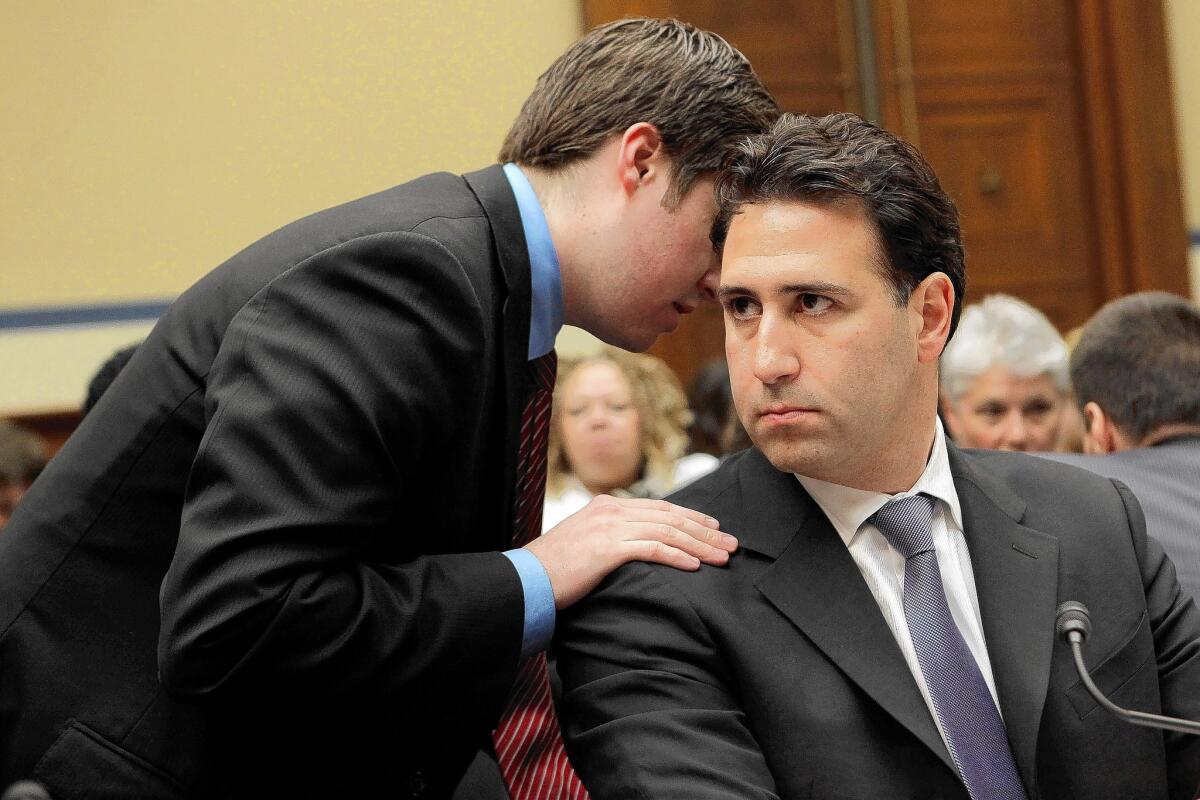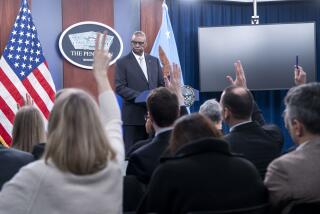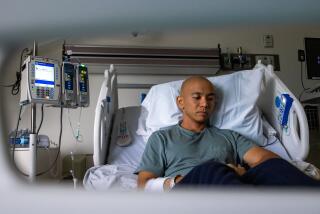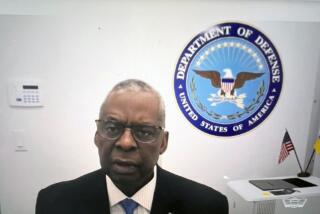Fighting for Obamacare through stage IV cancer

WASHINGTON — Michael Robertson put the bag of chemicals in an inside pocket of his sport coat, the pump in the other. He snaked the tubes between the buttons of his shirt to the port in his chest. He adjusted his tie to cover them.
Then he sat down in a cavernous room in the White House complex and pulled his chair close to the table, hiding the bulges.
Robertson, an aide to President Obama, was meeting with top officials from federal agencies working to implement the Affordable Care Act. He was also in treatment for stage IV colorectal cancer.
A soft “bzzt” every 90 seconds alerted him to another dose and another wave of nausea. He timed the cadence of his questions and comments to the ebb and flow of the chemo.
No one seemed to notice, and that’s how he wanted it.
As deputy Cabinet secretary, Robertson, 37, helps coordinate the president’s dealings with his department heads and top advisors. It’s the sort of high-pressure, behind-the-scenes job on which White Houses depend.
An adept multitasker who lines his bookshelves with white binders devoted to projects, he was perfectly cast for this role as the administration grappled with the complicated rollout of the healthcare law.
And for most of his tenure, he did so with determined anonymity, only to emerge from his silence in December after he saw a Senate debate over the law and was stunned by the ferocity of the opposition.
“It was personal against me now, and against all those people I met and saw throughout,” he said.
Robertson wrote a passionate account of his cancer and posted it on the White House website to illustrate how important insurance is even for younger people. Noting that he had paid just 1% of the $900,000 cost for five surgeries, radiation and chemo, he wrote, “Without that, I would have bankrupted my family just to stay alive.”
And without Obamacare’s guarantee that he could buy affordable insurance despite his preexisting medical condition, he wrote, “there’s no telling what life would have been like for us moving forward.”
Since then, he has become a symbol to colleagues at the White House of determination to carry out the law.
Robertson’s role in the healthcare overhaul — he insists it was a “bit part” — began early last year, just a week after his wedding, when he was still recovering from surgery and hooked to monitors at Georgetown University Hospital. His wife, Sahar Wali, checked his email and then, wordlessly, turned Robertson’s iPhone toward him, displaying a job offer from the White House.
He hesitated. People don’t go to work at the White House to get healthy. They leave to get healthy.
He wasn’t finished with his treatments. But he was an Obama lifer. Robertson had joined Obama’s team after graduating from Golden Gate University School of Law in San Francisco; he had gone to Illinois to help get the young state senator elected to the U.S. Senate.
Robertson glanced at Wali.
“What do you want to say 50 years from now?” she asked.
“I decided to do it,” he recalled. “Just take it a day at a time.”
Robertson, who grew up in Fresno in a family of teachers and administrators, had started in Obama’s Senate office coordinating requests for appropriations, then rounded up superdelegate votes during the primary campaign in 2008. After the election, he landed at the General Services Administration, the government’s landlord.
In the summer of 2012, however, he had been feeling tired. His doctor sent him to an oncologist who told him he had stage IV cancer. Robertson asked about the fifth stage. “There are only four,” the oncologist told him.
By the time he moved to the White House, he had survived radiation, chemotherapy and three surgeries.
Three weeks after he began the job, Robertson started a new round of chemo that took him to the hospital every other Thursday, where drugs flowed slowly into his veins all day. He would remain attached to a chemo bag through the weekend.
Just thinking of the word “Thursday” made him gag. The nausea grew worse. He dropped 15 pounds, beyond the 35 he’d already lost. He normally weighed close to 190. The chemo straightened the wave in his black hair.
As Robertson finished his chemotherapy, the Obama administration prepared to unveil HealthCare.gov, the website people in 36 states would use to buy insurance online. It was a debacle. For weeks, the site barely worked.
The law’s opponents cast Obamacare as a failure. Dispirited after one Senate debate, Robertson sat down on his couch and started to write. Over the next week, he relived his experience in a raw way, describing fear he hadn’t acknowledged.
His essay appeared on the White House blog, where bland policy updates are more typical. The president tweeted it.
Robertson was flooded with emails, Facebook mentions and phone calls from friends — many shocked to learn he was ill.
“One thing that you start to realize when you talk about serious health complications, the kind so serious that people usually keep to themselves, is that everyone has been touched by something,” he said.
As the enrollment period moved toward its March 31 deadline, Robertson’s official role diminished. He had another surgery — his sixth — to remove a spot from his lung. He’s back to full workdays now.
At night, he often heads to a nonprofit set up to help uninsured Americans sign up for policies. There, he works the phones.
“I had health insurance when I needed it,” he said. “If I can help one other person have what I have, I want to try.”
More to Read
Start your day right
Sign up for Essential California for news, features and recommendations from the L.A. Times and beyond in your inbox six days a week.
You may occasionally receive promotional content from the Los Angeles Times.







